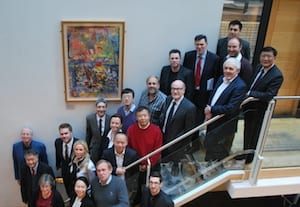Climate Crisis: Emergency Actions to Protect Human Health
By Ellie Forward, on 3 March 2014
Blog by Nick Watts, Head of Project, UCL-Lancet Commission
Join the conversation: Follow Nick on Twitter
“Above all, be visionary – this Commission is designing integrated solutions to what has been described as the biggest global health threat of the 21st century”. These were the parting words of Richard Horton – the editor of The Lancet – to the Commissioners at a recent London meeting.
 The 2014 UCL-Lancet Commission on Climate Change and Health is an ambitious initiative bringing together senior international climate scientists, economists, energy experts, and health professionals to present mitigation and adaptation policies necessary to protect human health from climate change, and promote sustainable development. The Commission is truly interdisciplinary and international, consisting a tripartite collaboration between University College London, Tsinghua University, and the Stockholm Resilience Centre. Within UCL, the Commission is working across the Institute of Global Health, the Energy Institute, the Institute for Sustainable Resources, the Geography Department, and the Department of Science, Technology, Engineering and Public Policy. Presenting its work in February 2015, the commission will ultimately aim to be policy-relevant, taking an academic ‘honest broker’ approach where experts in areas relating to climate change use their knowledge to integrate scientific knowledge more cohesively with policy.
The 2014 UCL-Lancet Commission on Climate Change and Health is an ambitious initiative bringing together senior international climate scientists, economists, energy experts, and health professionals to present mitigation and adaptation policies necessary to protect human health from climate change, and promote sustainable development. The Commission is truly interdisciplinary and international, consisting a tripartite collaboration between University College London, Tsinghua University, and the Stockholm Resilience Centre. Within UCL, the Commission is working across the Institute of Global Health, the Energy Institute, the Institute for Sustainable Resources, the Geography Department, and the Department of Science, Technology, Engineering and Public Policy. Presenting its work in February 2015, the commission will ultimately aim to be policy-relevant, taking an academic ‘honest broker’ approach where experts in areas relating to climate change use their knowledge to integrate scientific knowledge more cohesively with policy.
Published in the Lancet – arguably the most influential medical journal in the world – the Commission understands climate change as a ‘health emergency’. Its work is divided in to five working groups, each tackling a particular part of the policy response to this crisis, and tasked with producing a chapter for the final report. Over the next week, a post from each of the working groups should give you a better idea of what they’ve got planned. But in the meantime, here’s a brief summary of what they’re looking at:
1) WG1 will set the stage by laying out the latest evidence in climate science and the impacts these global environmental changes are having on human wellbeing. The group will attempt to employ innovative methods to demonstrate how global patterns of vulnerability shift with environmental and demographic changes;
2) In light of the scientific update above, section 2 will examine the most effective solutions to improve resilience in the most vulnerable communities. One area of particular interest being explored is with regards to identifying the limits to adaptation;
3) Experts in energy and climate change mitigation will explore the emergency technical solutions available, prioritising them according to their cost-effectiveness, time to implementation, and feasibility. In particular, Commissioners in WG3 will explore the ‘epidemiology of energy policy’, looking at what happens when large-scale policy changes are implemented in practice.
4) The fourth component of the report will discuss a broad range of alternatives to financing the defined technical solutions. They’re looking at a broad range of responses, including international trade, taxation (regressive and progressive), capital and bond markets, and investment incentives and penalties.
5) The final section will bring together the above policy options, providing insight in to the political mechanisms necessary to trigger a cascade of technical and financial action.
The task ahead of the UCL-Lancet Commission is indeed ambitious, with more than 60 academics and experts from around the world working on it right up until early 2015. The key findings of our work will take some time to come to light, but if the last 12 months are anything to go by, the results of the Commission will most certainly “be visionary”.
 Close
Close

